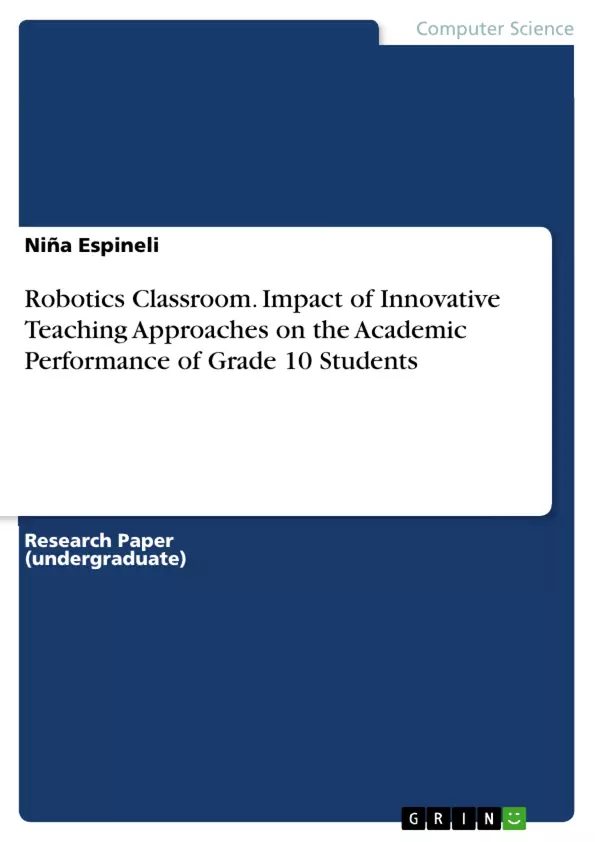Can innovative teaching methods truly spark a revolution in STEM education? Delve into an action research study conducted at Trece Martires City National High School, where the electrifying world of robotics becomes the catalyst for academic transformation. This compelling investigation explores the profound impact of integrating collaboration, dynamic group activities, and exhilarating mini-competitions into the Grade 10 robotics curriculum. Uncover how these dynamic pedagogical strategies ignite student engagement and significantly enhance academic performance in a crucial STEM field. Journey through a meticulously designed study that not only measures pre- and post-intervention scores but also captures the nuanced perceptions of students as they navigate the complexities and triumphs of robotics. Discover the secrets behind fostering a collaborative learning environment where problem-solving skills flourish and a deeper understanding of science and technology takes root. This research meticulously compares the academic trajectories of control and experimental groups, providing concrete evidence of the effectiveness of innovative teaching in action. Explore the pivotal role of robotics education in cultivating a passion for STEM, empowering students to become future innovators and leaders. Unravel the data-driven insights that reveal how collaborative learning, group dynamics, and the thrill of mini-competitions can unlock students' full potential and transform the landscape of STEM education. Witness firsthand the power of innovative teaching to not only improve academic outcomes but also to cultivate a lifelong love of learning and a dedication to the pursuit of scientific and technological excellence. This study offers a blueprint for educators seeking to revolutionize their classrooms and inspire the next generation of STEM professionals, providing actionable strategies and compelling evidence of the transformative potential of robotics education. Explore how carefully crafted interventions can reshape student perceptions, ignite enthusiasm for STEM subjects, and pave the way for a brighter future in the ever-evolving world of science and technology, making this an indispensable resource for educators, policymakers, and anyone passionate about fostering innovation and excellence in STEM education.
Inhaltsverzeichnis (Table of Contents)
- Context and Rationale
- Action Research Questions
- Proposed Innovation, Intervention and Strategy
- Action Research Methods
- Participants and/or other Source of Data
- Data Gathering Methods
- Data Analysis Plan
- Workplan and Timelines
- Cost Estimates
- Results and Discussion
- Conclusion and Recommendation
Zielsetzung und Themenschwerpunkte (Objectives and Key Themes)
This action research study aimed to determine the impact of an innovative teaching approach—incorporating collaboration, group dynamics, and mini-competitions—on the academic performance of Grade 10 students in robotics at Trece Martires City National High School (TMCNHS). The study sought to assess both the students' pre- and post-intervention performance and their perceptions of the robotics lessons.
- Impact of innovative teaching methods on student academic performance in robotics.
- Effectiveness of collaboration, group dynamics, and mini-competitions in enhancing learning.
- Students' perceptions of robotics as a subject, including their interest and engagement with the activities.
- Comparison of academic performance between a control group and an experimental group.
- The role of robotics education in increasing student engagement in STEM fields.
Zusammenfassung der Kapitel (Chapter Summaries)
Context and Rationale: This chapter establishes the foundation for the study by exploring the significance of robotics education in enhancing STEM engagement among students. It highlights the potential of robotics to foster collaborative learning, problem-solving skills, and a deeper understanding of science and technology. The chapter cites various research findings that support the positive impact of robotics on students' academic performance and critical thinking skills. It introduces the context of TMCNHS and its goal of increasing student participation in STEM subjects, setting the stage for the research by justifying the use of robotics as an innovative teaching approach within the Advanced Physics curriculum.
Action Research Questions: This chapter clearly outlines the research questions that guide the study. These questions focus on determining the impact of the innovative teaching approach (collaboration, group dynamics, mini-competition) on students' pre- and post-test scores and their overall perception of the robotics subject. The specificity of the questions ensures a clear direction for the research methodology and data analysis.
Schlüsselwörter (Keywords)
Robotics education, STEM engagement, collaborative learning, group dynamics, mini-competition, academic performance, innovative teaching, action research, student perception, Trece Martires City National High School.
Häufig gestellte Fragen
What is the context and rationale of the study?
The study explores the significance of robotics education in enhancing STEM engagement among students. It highlights the potential of robotics to foster collaborative learning, problem-solving skills, and a deeper understanding of science and technology. The context is Trece Martires City National High School (TMCNHS) and its goal of increasing student participation in STEM subjects, justifying the use of robotics as an innovative teaching approach within the Advanced Physics curriculum.
What are the action research questions?
The research questions focus on determining the impact of an innovative teaching approach (collaboration, group dynamics, mini-competition) on students' pre- and post-test scores and their overall perception of the robotics subject.
What are the objectives and key themes of the study?
The action research study aimed to determine the impact of an innovative teaching approach—incorporating collaboration, group dynamics, and mini-competitions—on the academic performance of Grade 10 students in robotics at Trece Martires City National High School (TMCNHS). Key themes include: the impact of innovative teaching methods, the effectiveness of collaboration, students' perceptions of robotics, comparison of performance between control and experimental groups, and the role of robotics in STEM engagement.
What are the keywords associated with this study?
The keywords are: Robotics education, STEM engagement, collaborative learning, group dynamics, mini-competition, academic performance, innovative teaching, action research, student perception, Trece Martires City National High School.
What is the proposed innovation, intervention, and strategy?
The proposed innovation includes incorporating collaboration, group dynamics, and mini-competitions into the robotics lessons for Grade 10 students.
- Quote paper
- Niña Espineli (Author), 2023, Robotics Classroom. Impact of Innovative Teaching Approaches on the Academic Performance of Grade 10 Students, Munich, GRIN Verlag, https://www.grin.com/document/1335115



